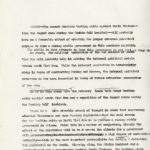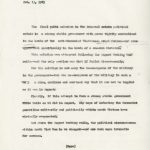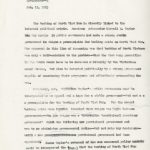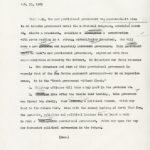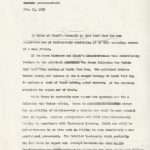1965, February 13, “Strong Stable Government”
deepe
government–1
feb. 13, 1965
SAIGON–The recent American bombing raids against North Vietnam–like the August ones during the Tonkin Gulf incident will probably have an a favorable effect of creating the proper internal political climate to form a strong stable government in this southern republic.
The gamble is that attempts to form this government do not fail as they did in August. In short, the military escalation of the war outside of South Viet Nam will probably help in solving the internal political crisis within South Viet Nam. While the external escalation is momentaryily risky in terms of confronting Peking and Moscow, the internal political situation is far more important in terms of future effective prosecution of the war.
It is in this sense that tIn this sense, The February bomgi bojb bomgi bombing raids against North Viet Nam are [now?] are a repetition of the August raids during the Tonking Gulf incident.
There is a seiz sizeable school of thought in South Viet Nam–among educated Vietnamese and some Western diplomats–that the real reason for the bombing raids in North Viet Nam at this time is to produce a strong stable government in Saigon. While this is a matter of conjecture, clearly the effect of the airstrikes will be to f create the climate for a government with powermxowhinginthehands ofthe ddddd. a high degree of centralized authority–which is the most important prerequisite for deating t defeating the Communist guerrillas in the South. Clearly, also, the Pleiku incident was a prextext–and not a reason–for bombing North Viet Nam; the bombing plans had been decr decided upon at least a year ago–but the timing of the airstrikes coincided to the needs of internal political developments.
deepe
government–2
feb. 13, 1965
The final polit solution to the internal crisia political crisis is a strong stable government with power tightly centralized in the hands of the anti-Communist Vietnamese armed forces–and more specifcall specifically in the hands of a one-man dictator–Lt. Gen. Nguyen Khanh.
This solution was attempted following the August Tonking Gulf raids–and the only problem was that if failed disasterously .
Now the solution is not only the re-emergence of the military in the government–but the re-emergence of the military in such a wa y a slow, cautious and confused way that it can not be toppled as it was in August.
Clearly, if this attempt to form a strong stable government fials fails as it did in August, any hopes of defeating the Communist guerrillas militarily and politically from within s outh Vietnam have virtually evaporated.
But since the August bombing raids, the political circumstances within South Viet Nam ha ve changed–and are much more favorable for success.
(More)
deepe
government–3
feb. 13, 1965
The bombing of North Viet Nam is directly linked to the internal political crisis. American Ambassador Maxwell D. Taylor in for months in public statements had made a strong stable government in Saigon a prerequisite for bombing raids in North Viet Nam. The argument in this line of reasoning was that bombing of North Vietnam was only a half-solution to the problem–that the Viet Cong guerrillas in the South would have to be defeated militarily by the Vietnamese armed forces, but also be defeated politically by a strong government capable of countering their propaganda and effectively prosecuting the war.
Obviously, now, Taylorhsx Taylor‘s public statements must be interpreted [only?] as an appeal and a hope for a stable government–but not a s a prerequisite for the bombing of North Viet Nam. For the recent bombing raids were lanched launched when Saigon was bogix between governments–the dne Saigon Government was a “progisiona “provisional caretaker government” which was following one provisional government and was to as administer governmental duties–but not make key decisions–until a new government had been provisional government had been appointed. Hence Taylor‘s reversal of his own announced policy and d could be interpreted tha (More) that the bombing of North Viet Nam is a necessary condition for forming a permanent government rather than vice versa.
deepe
government–4
feb. 13, 1965
This week, the new provisional government was announced–it also is an interim government until the s National Congress, scheduled to be [properly united?] March 21, elects a President, ratifies a strongman s constitution with power resting in a strong, authoritarian President, who will in Turn name a new governme–and hopefully permanent– government. This government wee’s ne week’s new provisional government, organized with five super-ministers overseeing the Cabinet, is important for three reasons:
1. The structure and form of this provisional government is vaguely that of the jar future permanent government–or in an imprecise sense, it is the “Khanh government without Khanh.”
2. Military officers will take a key part in the governme nt .
3. The pros Like after the Tonkin Gulf bombing, this government was formed too slowly, thus allowingcreating a political vacuum, which may lead to its future fall. Even with the recent bombing of North Viet Nam, the generals, religious and political leaders too[ten?] at least a week to form a non polit provisional government, which may open the way for Communist political subversion in the future.
(More)
deepe
government–5
feb. 13, 1965
Despite this faltering beginning, however, there is still more optimism for a strong stable government than there was following the Tonkin Gulf bombing of North Viet Nam. The most important factor is that American policymakers are more decisive than they were after Tonkin when they could not afford a political xx crisis–a d bloodshed in the streets of Saigon–before the American [presidential?] election. Second, Khanh has more power and the armed forces is much more unifime is more unified than it was fool following Tonkin. Third, Khanh will return to power in the government more cautiously, better protected–and significantly more legally–than he did i after the Tonkin affair. Fourth, the al alternative to the military regime is that of a civilian government and sivex in past few months this alternative has been soundly discredited.
This man’s political gambit
The big gamble [mark?] is that Khanh will not be assassinated; the big question mark is whether the Buddhist political leaders will again openly oppose him through street demonstrations.
(More)
deepe
government–6
Vietnam
South Viet Nam has been submerged in a lingering, unsolved political crisis since–and a little before–the fall of the Ngo Dinh Diem regime November, 1963. At that time, Viet Nam had a strong centralized government. The problem since has been to create another–but this time the power will rest in the hands of the military. When Diem was sever overthrown by the armed forces, a committee-type government of gner generals followed for 89 days. These generals of the first military junta plans partially ominin Even in late 1963, these American officials in Saigon discussed with these generals of the first military junta ideas and plans for bombing North Vietnam. They were reportedly lukewarm to the idea–and were soon toppled from power by Khanh on Jan. 30, 1964.
Khanh‘s first months were [marked by dignity and combatitiveness?] but he attempted to smother these conditions following the August 5th Tonkin Gulf incident and the first bombing of North Viet Nam by American planes. Two days later he is instituted a virtual state of martial law, with curfew hours, censorship of local press and other necessary control measures in a state of emergency. Eleven days after Tonkin, he attempted to seize power by having himself elcted elected President [behind ?] with a strong-man constitution by ahis 50-man military revolutionary council.
deepe
government–7
But he hesitated for somethinmnm to name his new government, a power political power vacuum ensued, and soon street demonstrations and religious violence demanded first the abolition of the strong-man constitution and second the abolition of the “military dictatorship.”
Again, he was indecisive–yet he was without the power to act decisively. His long-time friend and commander-in-chief of the Armed Forces, Maj. Gen. Tran Thien Khiem refused to use the armed forces to crush the mobs; Khanh‘s [only?] political support–the Dai Viet political party–was organizing the street demonstrations along with Buddhist leaders calling for Khanh‘s downfall; Khanh‘s political rival and pro-Buddhist chief of state Maj. Gen. Duong Van Minh sapped Khanh‘s political support.
But moott most important, American officials in Saigon were also in a state of immobility–for eight days during the crisis there w as no contact between Ambassador Taylor and Khanh–and the American policy appeared to western observers here [to be?] simply to keep the lid on th until after the American election.
Khanh somewhat miraculously survived by agreeing to abolish the constitution and by forming a triumvirate with Khiem and Minh. But the most important concession was to dissolve the military junta council and to give to i a civilian High National Council the right of deciding the future constitution and the future members of the government. Two of the 17 members of the High National Council were suspected Communists; it raished the prospects that in time this x civilian coun council would legalize a non xc
deepe
government–8
feb. 13, 1965
Unlike after the Tonkin Gulf crisis, however, when Khanh seized the Presidency with lightning speed, he has Now moved slowly and cautiously to gain quietly more power and unity than he had when he entered office A Year Ago. during the past ix months, both Khiem and Minh have been virtually exiled from the country; the political parties which had opposed him have been crushed andmdmmm leaderless; the civilian alternative to the military solution has been soundly discredited; the working relatioship relationship between the Americans and the Vietnamese Khanh is closer than it was in August–but still not close enough. He has shown political tacita tactical skill in out-maneuvering the Buddhist political leaders, who will [be?] the troublemakers int he future during the anti-Communist war.
But while Khanh was re-gaining his political power, the Armed Forces in a slow
For the past months since falling from power, the objective of all pwer perhaps the most confused and crucial political intrigue in history has been to re-establish the political power of the anti-Communist armed forces (instead of the civilians who could swing pro-neutralist) and then to bring them and Khanh into the government in such an inconspicuous fashion that they could not be toppled.
deepe
government–9
feb.13, 1965
This has been done by a coup d’etat in three installments. The military xrmaxx council of 20-generals first overthrew on Dec. 20 the legal basis of the government–the 17-man high National Council. Then on Jan. 27 they overthrew the other two components of the government–the Chief of State and the Prime Minister. Theny then re-instated the aged Chif Chief of State–but significantly his powar legality is now based on that of the military junta and and not not the civilian council—. andthe military has named an acting Prime Minister who would become the caretaker until the a new provisional regime was named. This new provisional regime, named this week, is home to the 2 1/2 phase installment of a three-phase coup d’etat. This government is in officiad has vaguely the structure of “khan‘s government without Khanh.”
In the forthcoming installed.m half-installment of the coup d’etat, Khanah a new censtituion constitution along the lines of France’s Fifth Republic would be ratified and on ofren 21st Khanh is scheduled to cecome would be popularly elected Vietnam‘s Charles deGuall de Gaulle. Once, by popularly elected National Congress popular elected tThis laborious And Regal prosess process of seizing power is again deemed mandatory to eliminate the reasons for which future pro-neutralist, pro-Buddhist street demonstrationsors could to again clamor for his downfall. As an additional protection, Khanh will be surrounded by three political scream screens–his own milita ry junta, a 2-man 20-man military-civilian council to solve religious question rathern than to allow steet demonstrations–and the National Congress of popularly-elected delegates.
deepe
govenx government–10
feb. 13, 1965
An index of Khanh‘s present strength is thatthe fact that his own supporters –And Not His Enemies– are mi deliberately minimizing it by sperHis [Power?] by spreading rumors of a coup d’etat.
If American blunders and Khanh’s indecisiveness were contributing factors to the political dissmarx vha chaos following the Tonkin Gulf bojb bomg bombing of North Viet Nam, the political climate before during and because of the h recent bombing of North Viet Nam is perhaps a mark of their [present?] subtle, quiet success. of the American officials in Saigon and of Khanh.
While there is certainly more reason for optimism now tha n following the Tonkin affair, there is alwas the possoomofmmm always the possibility of mistakes–but a mistake now would be more crucial than in August. Amrican policymakers can still make blunders–by failing to coordinate with Vietnamese leaders. Khanh can still be indecisive–as he is this week in failing to name immediately a new provisional government. The Buddhist leadership which partially toppled Khanh in August can attempt to block his rise to the Presidency–or to topple attempt to op topple him from power–and theyAttempt to gain concessions unit, [restored future currency and for the Anti’s?] Government undoubtedly will try this. And the Viet Cong Communists can–and will obviously attempt–to use political subversion to sabotage the government as well as military offic offensives in the provinces.
deepe
government–1011
Clearly, however, if after the Tonkin bombing raids the failure of Khanh and the Americans was a disaster, a failure after these recent raids would be the near-end for defeat containig containing the Communists within South Viet Nam. And, clearly, as the bombing raids show, American policymakers have decided that substational risk victory in South Viet Nam is worth the substantial risks of escalation outside its borders.
-30-
Read Previous Article: 1965, January 18, “Vietnamese Intelligence Officials, Unconfirmed Reports”
Read Next Article: 1965, February 16, “American Billets and Vietnamese Airbases”

